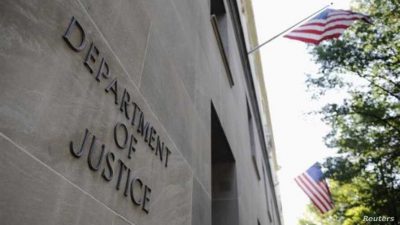Implementing the “Biden Environmental Litigation Bounce-Back”
Encouraging Signals As To How Biden’s USDOJ Will Resolve Environmental Lawsuits Originally Brought Against the Trump Administration

The transition from the Trump Administration to the Biden Administration makes for fascinating spectator sport. President Biden’s first month in office reveals that he and his Administration are committed to undoing the widespread damage former President Trump and his minions engineered across so many policy and legal areas. The environment is a particularly prominent example.
Notably, opponents of the Trump Administration’s environmental rollbacks used litigation as an especially frequent tool to challenge those rollbacks. One example: California Attorney General Xavier Becerra filed some 123 different lawsuits on behalf of the State of California to contest Trump’s health care, civil rights, consumer protection and immigration policies. But of the cases A.G. Becerra brought, a majority–70–challenged the Trump Administration’s environmental rollbacks.
Most of this litigation remains pending. Ironically, President Biden has inherited these many cases, even though he opposed virtually all of the Trump environmental rollbacks on the presidential campaign trail in 2020. The media has generally overlooked this batch of inherited litigation in favor of cabinet appointments and other transition-related issues. But how and when the Biden Administration responds to and resolves the environmental docket it has inherited from the previous Administration will be enormously consequential.
Ultimately, that task will fall to Attorney General-designee Merrick Garland and the leadership team President Biden and Merrick recruit to the U.S. Justice Department. Within USDOJ, the key players on this front will be the Assistant Attorney they appoint to lead the Department’s Environment and Natural Resources Division and the Solicitor General of the United States. (The Solicitor General is best known for serving as the federal government’s advocate before the Supreme Court; of critical importance, however, s/he also oversees the government’s litigation docket in the federal appellate courts, where many of the environmental cases inherited from the Trump Administration are currently pending.)
Even though these top USDOJ officials are not yet in place, the preliminary signs are encouraging that the Department and Biden Administration will approach this pressing environmental caseload in a responsible and timely manner. Here are two recent indicators–both from the U.S. Supreme Court:
Sierra Club v. Trump. Currently pending before the Court is a case the Sierra Club and California A.G. Becerra brought against the Trump Administration, challenging the construction and financing of Trump’s Border Wall. They sued on multiple grounds, the most consequential of which is the legality of Trump’s diversion of Congressionally-appropriated funding intended for the Pentagon to instead finance construction of the Border Wall. Previously, a federal district court in California and the Ninth Circuit Court of Appeals both ruled in the Sierra Club’s and California’s favor. The Trump Administration then successfully obtained Supreme Court review. Written briefing is concluded in the case, and the justices had scheduled oral arguments for early this year. However, last month the Biden Administration asked the Court to take the Sierra Club case off-calendar while it reconsiders the government’s legal position. The justices have agreed to do so. Reading the legal tea leaves, it seems quite likely the Biden Administration will ultimately abandon the government’s defense of the case its predecessor had brought to the High Court.
Cedar Point Nursery v. Hassid. The Cedar Point Nursery case–also from California–involves a subject of great ongoing interest to the Supreme Court justices: the intersection of government regulation and private property rights protected under the “Takings Clause” of the U.S. Constitution. The factual setting of Cedar Point is a labor dispute rather than one involving environmental regulation. But the Court’s decision in the case is likely to have a major impact on a wide spectrum of environmental regulatory and natural resource management programs. Just before President Trump left office, his Solicitor General filed a friend-of-the court brief in the case. It argues in full-throated support of the Pacific Legal Foundation’s position that a California regulation, requiring agricultural companies to allow limited access to company worksites by farmworker union representatives, constitutes an unconstitutional “taking” of private property for which California must pay compensation to the companies. Earlier this month, however, the Biden Administration filed a letter with the Court indicating that the Trump Administration’s “brief no longer represents the position of the United States” and, indeed, declaring that the challenged California regulation–in “accord[ance] with the United States’ longstanding view–is constitutional.” (I’ll post further commentary on the pending Cedar Point Nursery case as the justices prepare to hear oral arguments on March 22nd.)
These two cases–and the strong position shifts the Biden Administration has telegraphed in both of them–are early guides as to how President Biden’s USDOJ intends to resolve the formidable backlog of Trump environmental rollback lawsuits that the new Administration has inherited. Those early signals are both welcome and most encouraging.
{For those interested in tracking these litigation developments prospectively, let me give a shout-out to an important initiative recently launched by fellow Legal Planeteer Ken Alex and his colleagues at U.C. Berkeley Law’s Center for Law Energy & the Environment. As Ken recounts in his own recent post, they’ve created an excellent new website tracking all of the lawsuits challenging the Trump rollbacks; how the Biden Administration is responding to those rollbacks and subsequent litigation challenges to them; and offering suggestions as to how the new Administration can best resolve those lawsuits. Most useful and timely information!)





Reader Comments